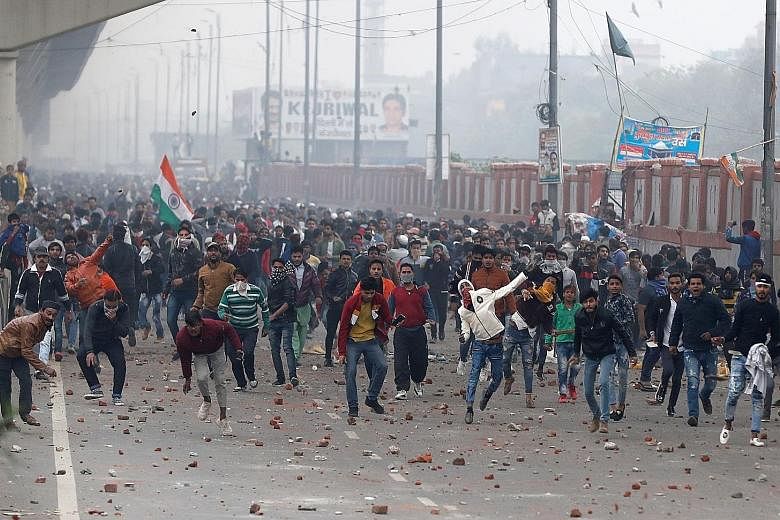A video that surfaced on Monday has become emblematic of university protests raging across India this week.
In it, a group of Indian policemen in riot gear can be seen at the gate of a house in New Delhi, confronting five unarmed young women shielding a man.
Within seconds, the policemen have dragged the man out and started thrashing him with batons, stopping only when the women block the blows with their bodies.
This viral clip is one of several that Indian college students are sharing this week, amid a surge of protests across the country against controversial changes to India's citizenship laws. The students have been identified as being from the Jamia Milia Islamia University in the Indian capital.
By yesterday, there were street protests in at least 25 cities across the country against the new laws, and reports of the police in many cities using tear gas and rubber bullets, and beating students in the protests.
At least six protesters have been killed in violent clashes with security forces and over 100 injured. But demonstrations, most of them peaceful, continued for a fifth day, and crowds were growing.
The changes to the citizenship law were brought about by the Citizenship (Amendment) Act, which Parliament passed last week.
The law now provides special protections for non-Muslim migrants to India - specifically those of Hindu, Christian, Sikh, Buddhist, Jain and Parsi faiths - from Afghanistan, Bangladesh and Pakistan, assuming that they migrated to escape religious persecution.
These migrants will no longer be treated as illegal, and can become naturalised Indian citizens within five years.
-
25
Number of Indian cities which saw street protests against the new laws.
6
Number of protesters killed in violent clashes with security forces.
>100
Number of people injured.
Indian Minister for Home Affairs Amit Shah declared that the changes were intended to right the wrongs of the partition of India, and designed to protect persecuted minorities in neighbouring countries that had Islam as a state religion. India does not have a refugee protection law.
But critics, including several opposition political parties, maintain that the changes violate India's secular Constitution by making religion a ground for citizenship.
They add that the Act ignores the persecution faced by Muslim minority groups in Pakistan and Afghanistan, the Rohingya in Myanmar, as well as Tamil Hindus and Muslims in Sri Lanka.
The United Nations human rights office has called the law "fundamentally discriminatory".
The Citizenship (Amendment) Act is also seen as being linked to a controversial citizenship registration process in the north-eastern state of Assam that was intended to identify illegal immigrants. More than 1.9 million people, including Muslims and Hindus, are excluded from that list.
The amended citizenship law could provide a way out for these Hindus deemed foreigners, but not Muslims.
Mr Shah has said the citizenship registration will soon be extended to the rest of the country, sparking fears that the amendments will further marginalise the country's 200-million Muslim minority.
Protests in north-eastern states such as Assam, which has a history of agitation against foreigners, are over different concerns. The protesters fear that the new law will allow many Hindu immigrants from Bangladesh to become citizens, depriving indigenous people of scarce resources.
Both Mr Shah and Prime Minister Narendra Modi have assured Indians that the citizenship law will not affect the "culture, language, social identity and political rights" of the country's north-east.
Meanwhile, in other parts of the country, demonstrators have called the law a threat to the idea of India.
Students at the India Gate, the capital Delhi and in the Indian Institute of Science, Bengaluru have been reading aloud the preamble to India's Constitution, which declares the country a secular democratic republic.
At an election rally in Jharkhand's Barhait, Mr Modi said: "I appeal to youth in colleges to debate our policies, protest democratically. We will listen to you."

